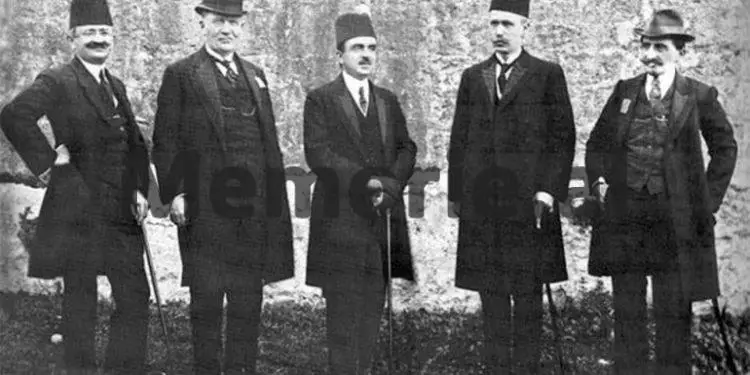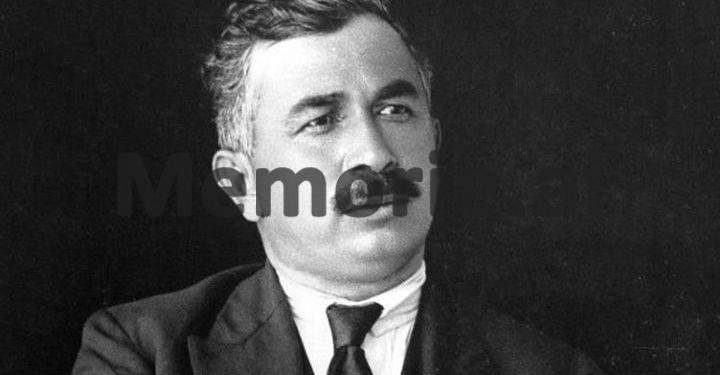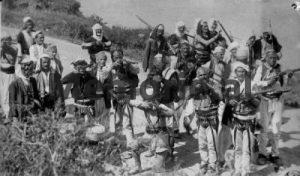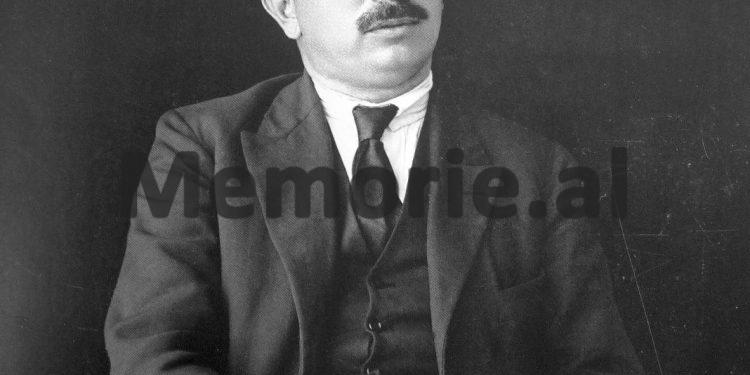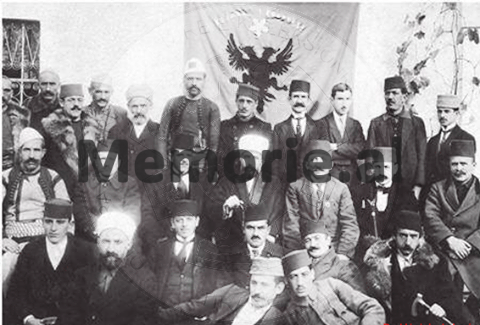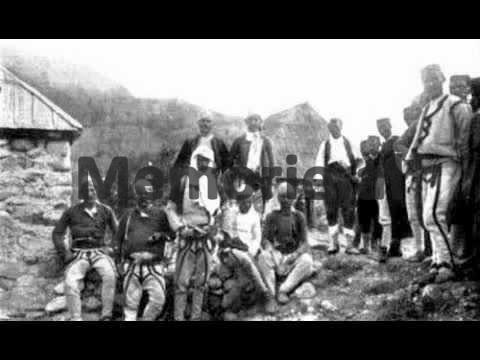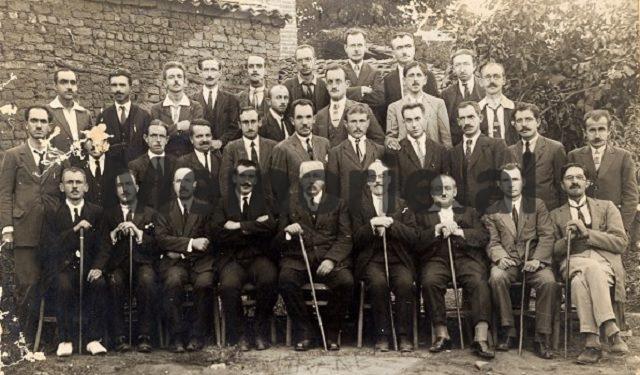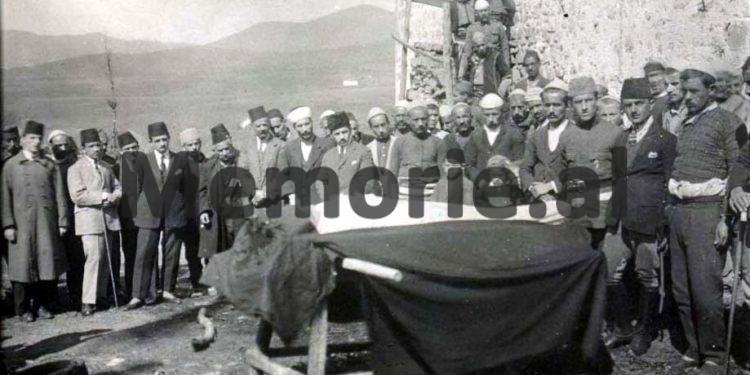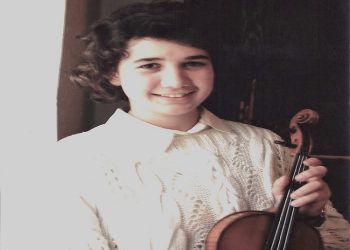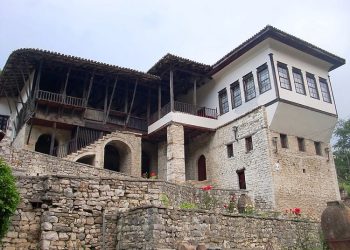Sherif Delvina
Memori.al/ publishes the unknown story of Sulejman Delvina, one of the suckers of the famous Delvinjote family, who after being educated in Ioannina, Istanbul, where he was also taught as a lecturer at the Galatasaraj High School, he served in high positions and functions. in the administration of the Ottoman Empire and then returned to his homeland, engaging in the Congress of Lushnja, where he was entrusted with the task of Prime Minister, Deputy Minister of Interior and Minister of Justice. Unknown documents issued by the Central State Archive in Tirana for the former Albanian Prime Minister who headed the first government cabinet to emerge from the Lushnja Congress, from his political career and his role as a prominent statesman and patriot, in establishing and consolidating of the Albanian state, until his resignation from the head of the cabinet!
Graduation in Istanbul where he also served as a lecturer at the Lyceum of Galatasaraj
Sulejman Delvina was born in 1873 in the town of Delvina, in one of the most famous and famous families in the whole of Southern Albania. After finishing primary school in his hometown, he went to the gymnasium of Ioannina and from there to that of Melqija in Istanbul. He graduated from the Faculty of Mylqi in the capital of the Ottoman Empire in 1898, and after graduating, he was immediately appointed attaché to the Turkish Ministry of Interior and then as secretary in the decree office of the Prime Minister. In the same years, he served as professor of literature at the Lyceum of Galatasaraj and the gymnasium of Vefa. Teaching at the Lyceum of Galatasaraj, where French was the basic language of that lyceum full of valuable books of that time, Sulejman Delvina used that western environment, the rich library of the lyceum and with those books, he became acquainted with the news of science of western states. He was subsequently appointed deputy head of section and head of section in the Turkish Ministry of Interior and shortly afterwards, in the position of director general of local affairs of the vilayets. After the General War, Sulejman Delvina went to Paris as the delegate of the Albanian colony of Istanbul, where together with him were also Halil Pasha Gjirokastra with Fuat do Dibra.
Prime Minister in the government formed by the Congress of Lushnja
In January 1920, Sulejman Delvina participated in the Congress of Lushnja, where he stood out as one of the main actors of that major event, which paved the way for the reorganization of the Albanian state. Regarding this, in the magazine “Minerva” of 1932, the well-known publicist, Nebil Çika, in the article entitled: “The death of Sulejman Delvina”, wrote, among other things: “The Congress of Lushnja complemented the new government by electing a the nine-member cabinet headed by Suleiman and the appointment of a 37-member Senate or National Council with parliamentary powers until the time of the general election. The Cabinet consisted of the following: Sulejman Bej Delvina, Prime Minister, Mehmet bej Konica, Minister of Foreign Affairs, Ahmet Bej Zogu, Minister of Interior, Kadri Bej Prishtina – Minister of Justice, Sotir Peci, Minister of Education, Ndoc Çoba, Minister of Finance, Eshref Bej Frashëri, Minister of World Affairs, Idhomene Kosturi, Minister of Posts and Telegraphs and Ali Riza Pasha Kolonja, Minister of War.
The High Council of the Regency of four people was also elected: Mr. Monsignor Bumçi, Aqif Pashë Elbasani, Abdi Toptani and dr. Mihal Turtulli. In this Congress, the National Council was formed, and the Statute of Lushnja was approved, which was the basic law of the new Albanian state. He announced the separation of religion from the state and decided that later, when elections were held, the Constituent Assembly would determine the form of the regime. So, in Lushnja, the sovereignty of the Albanian state was sanctioned with the bodies set up by the Congress”.
Ali Këlcyra’s writing about Sulejman Delvinë
While in the newspaper “Mbrojtja Kombëtare” dated November 11, 1920, in the article entitled “Rule of State”, Ali Këlcyra defines the Congress of Lushnja as follows: is written in golden letters in our history”. As for the Prime Minister Sulejman Delvina, he says: “Sulejman Bey, who these days that happens in government gave evidence not only as a learned man, but also as a statesman with character.” The Congress of Lushnja rejected the compromise on January 13-14, 1920, where the Great Powers demanded the partition of Albania. The Lushnja Congress also overthrew the pro-Italian government of Durres, vowing to fight for the liberation of the country. The government of Sulejman Delvina, within a period of ten months, successfully solved the tasks assigned to it by the Lushnja Congress. On February 11, the government moved to Tirana, which has since become the capital of Albania. On March 13 of the same year, the unification of Shkodra with the national government of Tirana was announced, avoiding the Yugoslav armed units that had come close to Shkodra. Regarding this, in a letter of Sulejman Delvina, it is said: “Tirana on 8-IV- 192O. Appellate Prosecution Review. After the letter of the Prime Minister no. 252/1 and 4/4/20, You are informed that the Council of Representatives, with the will and desire of its councilors, was renamed the National Council. Deputy. Minister of Justice. Prime. S. Delvina (d.v.)” (Fund 249, file II-12 of 1920).
Sulejman Delvina’s report on the government he headed
On April 29, 1920, Sulejman Delvina reported to the National Council that: the government has implemented the decisions of the Lushnja Congress. In this regard, the report of Prime Minister Delvina states: “The Congress of Lushnja, giving confidence to the new government, presented the political program, which it has accepted and on which it has sworn and this program is the protection of independence full of sovereign rights of the territorial integrity of the Albanian state; so now the government is left with only you to present the development of the internal program in all branches of administration and the path it has to follow to protect national rights, according to the Lushnja program. To ensure full independence the government has decided not to recognize any foreign government interfering in state affairs and this decision has been and will be maintained by any theory for securing the territorial integrity, which is completely damaged by foreign powers … ”(Fund 146, file 23, years 1920-1929, p. 8).
In the areas of domestic policy, the government led by Sulejman Delvina directed the development of its program in all branches of administration. Also, in file 23, (quoted above), there is also talk about the Ministry of Interior. There, among other things, it was emphasized that: a battalion located in every center of the prefecture, will form three mobile battalions ”
Also in file 23 of fund 146, years 1920-1929, with the subtitle “Finances”, it is written: The General Treasury of Finance has to present together all the receipts, as well as the permanent breakdowns of the state, to be regulated, not to burden the state outside the financial powers that the state may have, although it seems that the receipts today are not made can afford it ”. In this context, we add that Prime Minister Sulejman Delvina for the provision of funds in early March 1920, issued the decision to issue an internal loan of two million gold francs, which would be repaid within two years. It is worth noting that Korça, at the time of unification with the rest of the country, handed over to the central government of Tirana the state of the coffers which included the amount of two million French francs, much that was saved by the good administration of the French administration during the French occupation. The government of Sulejman Delvina, which emerged from the Congress of Lushnja, ruled the country right after the First World War, where the material and human damage in Albania was very great. She tried to well-administer the country and managed not to borrow from any foreign state. As for education, the situation in Albania during the rule of Sulejman Delvina was miserable, as books, furniture, school buildings were missing. In this context, that government had to create from nothing, everything related to education, prepare skilled teachers, compile books and take care of furniture and buildings. (Parliament, Fund 146, File 23, 1920-1929).
Consolidation of the judiciary by the Delvina government
As far as the judiciary is concerned, at that time Turkish legislation was used, which had previously been done by the government of Vlora, for the interests of the Albanian state, but in the government headed by Sulejman Delvina, changes were made in the judicial organization, in the types of courts. Thus, after the Court of Peace, (of Fact, our note), came the Court of First Instance, of Renewal and last, the Court of Dictatorship, (Appellate), was the highest instance in the judicial system of that time. Sulejman Delvina was not only the Prime Minister, but also the Deputy Minister of Justice. Among other things, regarding the exercise of that second duty, the following documents are also mentioned, where it is said:
“Presidency of the Ministerial Council. Ministry of Justice, in Tirana. We are sending you here the appendix of the laws of organization and the law of the employees temporarily certified by the National Council, Nr. 51, dated 28-05-1920, approved by the High Council, no. 108 on 19-07-1920, to put it into full operation.
Tirana, 11. VIII 1920
Prime.
Sulejman Delvina
(Ministry of Justice, Organization Framework, Fund 155, File II-13, years 1919-1920).
Ministry of Justice
Prime Minister Tirana
In response to your letter 1346, we have the honor to announce to Your Excellency that the trial panel of the Berat Renewal is complete. But in the change that was made, the prosecutor was appointed chairman and Mr. Hamid who was the interrogator was appointed assistant member. Because they could not be found in the sight of some plaintiffs after a letter from the prosecution of Diftim orally of Mr. Prefect of Berat, it was learned that the court of Berat could not act regularly. In order not to cause delays in the trials, a special order was given to appoint Mr. Faik Monopati, the newly appointed interrogator to fill the trial panel. Tirana 8-8-1920.
We present this inscription with special honors.
Prime Minister and Deputy Minister of Justice
Sulejman Delvina
In order not to cause delays in the trials, Faik Monopati was appointed interrogator in the Berat renewal trial by special order. (A.Q.SH. Fund 249, File I 223/3, p. 119)
The role of Sulejman Delvina in Albanian diplomacy
On May 28, 1920, the “Kapshtica Protocol” was signed with the Greek government, the borders of 1913 were recognized, and thus the entry of the Greek army in the South of Albania was prohibited, but 26 Albanian villages remained in the hands of the Greeks. With the agreement of the government of Tirana, Albania’s relations with Italy were normalized. The government led by Sulejman Delvina tried for complete liberation from the north and the east, complaining with grades 12 and 14-VIII-1920 about the unjust violation of Albanian land. At the same time, the government did what it could to get Albania admitted to the League of Nations. The favorable vote given by the Assembly of the League of Nations on December 17, 1920, was a great victory for Albanian diplomacy. The government led by Sulejman Delvina managed to liberate most of Albania, set up the Albanian administration and created the National Army for the defense of the homeland. The Albanian government did not accept the Italian proposal for the protection of Vlora for “security” reasons, for the good of Albania itself! It did not allow the territorial integrity of Albania to be violated and Sulejman Delvina tried to liberate the country by diplomatic means, with the protection of the interests of the Albanian nation in the international arena. She did not openly show solidarity with the Vlora war, but helped her with everything she could. Sulejman Delvina was distinguished for his great culture as he had completed the high school of Political-Administrative and Economic Sciences at Istanbul University (the largest of the Ottoman Empire), where senior executives were trained in various fields of imperial administration, which caused him to be entrusted with important tasks in the Ottoman Empire.
The work and role of Sulejman Delvina as Minister of Interior
In addition to the post of Prime Minister, Sulejman Delvina also held the posts of Deputy Minister of Interior and Justice. In these tasks he tried and fought with all his might for the creation of the basic institutions of the new Albanian state reorganized after the Congress of Lushnja. In the framework of these tasks, Sulejman Delvina worked on the consolidation of the judicial system and its proper functioning. Related to this are some documents and materials that we are quoting below, which clearly show his work and great role as a nationalist and diplomat, who tried to lead the Albanian state with justice, prudent behavior, wise advice and valid, without causing conflicts, trying to save the newly created Albanian state. Thus, in the document dated September 5, 1920, which is in the archival fund of Bajram Curri, it is written, among other things:
Dear Sir, The acceptance of the weapons sent on behalf of Hasan Bey (Hasan Prishtina, our note), by D’Annunzio (D’Annunzio), has a lot of extraordinary political incompetence, if Europe finds out that the Albanian government has relations and collaborates with D’Anuncion, whom he treats as an adventurer, had to give a very bad judgment and would treat him as a disturbing and confusing element. According to the latest news, England does not want any way to ignite the fire of war in the Balkans. “America, which is our biggest defender, if it finds out that we are working with D’Annunzio, it will change the good thoughts and good intentions that it nurtures for us.”
But what was the truth of the problem that Sulejman Delvina posed to Bajram Curri in that letter? At that time, the Council of Ministers, headed by Sulejman Delvina, decided not to unload in the Albanian ports an Italian steamer, which was loaded with weapons and ammunition and other weapons. This ship had come to Durrës to unload the weapons sent by D’Annunzio to the Kosovars, so that they, once receiving these weapons, would be thrown into an uprising. If these weapons arrived in Kosovo, the Serbs, in retaliation for the actions of Kosovars, would burn entire villages and cause a new exodus of Kosovars. The steamer that was sent to Durrës was not accepted there and after being expelled from there, it went to Shengjin, where it was forcibly stopped by the gendarmes. At this time, the Yugoslav forces were concentrated in the Buna Gorge, ready to occupy Shengjin in case of unloading weapons.
Delvina: Let us not tarnish the name of Albania
Regarding this event, in the above-mentioned letter, Sulejman Delvina writes: “The respect we have gained in Europe with the happy event of Vlora, if we smear it with some reckless behavior, the desire that European countries have for a newly formed independent Albania, and then, our miserable homeland, will be lucky forever. It was said that Esat Pasha had destroyed Albania so far. But this time, if Albania is destroyed, it is destroyed with our hand, it will be a disaster and a great damage for us. If we continue with our actions to bring concerns to Europe, I assure you with my honor and conscience that Albania will disappear … ”
Unfortunately, the friend of the Committee “National Defense of Kosovo”, D‘Anuncio, took care of securing these weapons and landing them on the Albanian coast. And to show who the fascist was, Gabriele D’Annunzio, we quote the news of the newspaper “Shqipëria e Re”, where it is reported that the Italian poet, D’Annunzio, sent 30 million bullets to Albania to kill Albanians in the Vlora War. (Document No. 80. Documents and historical materials from the struggle of the Albanian people for freedom and democracy 1917-1941, Tirana, 1959).
Among other things, in those documents, it is about D’Anuncion, where he expressed his grief for the loss of Vlora: “How can you, defenders of Fiuma, feel pain and grief for Vlora to return to the Albanians? You do not fight against “Any kind of robbery, oppression? Do not you defend as in Fiume at all costs the principle of nationality and the popular right to reunite with the chosen homeland?” (For D’Annunzio, the chosen homeland was Italy, with which Vlora had to reunite, because, as De Anuncio himself claimed: “Because of the expulsion from Vlora, Italy is a great soprano chorus of castrates …”) Memorie.al
Continues tomorrow




